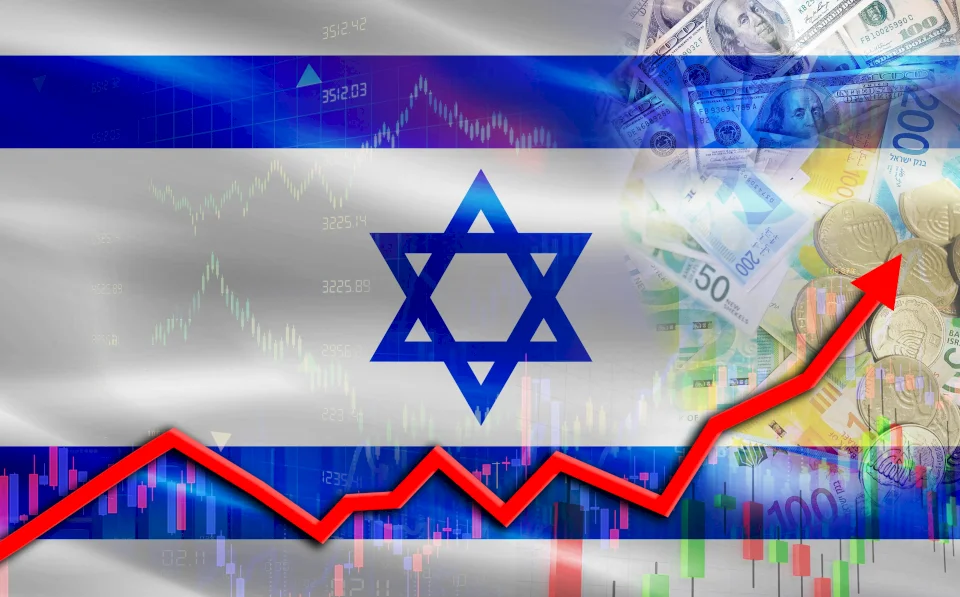
Report: End of the War Could Return the Israeli Economy to a Rapid Growth Path
SadaNews Economics - The Hebrew newspaper "Yedioth Ahronoth" published an economic report discussing the potential repercussions of the end of the war between Israel and Hamas on the Israeli economy, considering that this stage could mark a critical turning point in the Israeli economic trajectory.
The report indicates that the return of hostages and the demobilization of reservists could open the door to ten key changes, which could return the Israeli economy to a rapid growth pace, including strengthening the local currency, lowering interest rates, and resuming foreign investments.
Here are the main transformations discussed in the report as translated by SadaNews:
1. Tel Aviv Stock Exchange: Towards a Positive Trend
Although the Israeli stock market experienced unexpected increases during two years of war, the end of military operations could more clearly reflect on trading at the Tel Aviv Stock Exchange. The market needs a climate of stability and optimism, and trades are expected to trend positively today. If the war officially ends, trade relations with Israeli companies will resume, and the boycott imposed on certain sectors, including defense and military exports, may be lifted.
2. Shekel: Continues to Strengthen
Recent trading has shown a noticeable improvement in the value of the shekel, as the exchange rate of the dollar fell below 3.30 shekels (3.29), the lowest level in three years. The euro also declined to 3.87 shekels on Friday evening. Although representative exchange rates for today have not been set, analysts expect the shekel will strengthen further with the resumption of trading on Monday.
3. Credit Rating: Will Not Be Negatively Affected
Credit rating agencies were on the verge of downgrading Israel for the third or possibly fourth time by Moody's since the war broke out. However, stopping this downgrade will lead to freezing this intention, meaning that the terms of loans obtained by the Israeli government worldwide will not worsen in the initial stage.
4. Military Spending: Towards a Significant Decrease
The cost of the war to the Israeli economy so far has reached about 330 billion shekels, which is more than half of the adjusted state budget for 2025 (650 billion shekels). One day of fighting at the beginning of the "Gideon Chariots 2" operation cost around half a billion shekels. With the cessation of the war, daily spending will decrease to about half this amount, especially after the demobilization of reservists and the halt of attacks and bombings using expensive munitions.
5. Defense Budget: Freezing Additional Requests
The cessation of hostilities will give the Finance Ministry a justification not to respond to the Israeli army's request to transfer an additional 20 billion shekels. It is unlikely that even the two to four billion shekels initially approved by the ministry within the 2025 budget will be transferred.
6. Business Sector: Beginning of Recovery
With the demobilization of reservists, tens of thousands of workers will return to their jobs, leading to a recovery of the commercial sector that has been severely affected due to the extensive mobilization of reservists during the "Gideon Chariots 2" operation in Gaza.
7. Fiscal Deficit: Towards Decrease
The fiscal deficit rose last month to 5.2%, and there were concerns it would reach about 6% by the end of 2025. With the cessation of war, this deficit is expected to gradually decrease.
8. Economic Measures: Possible Cancellation
Ending the war and not exacerbating the fiscal deficit may spare the Israeli government from resorting to sharp cuts in the 2026 budget, cuts that the Finance Ministry has already begun planning, especially in the education, health, and social welfare sectors. It may also be possible to resume support for infrastructure projects and freeze any additional tax increases.
9. Interest Rates: Expected Decrease
The Bank of Israel, which has been cautious in its decisions due to inflation concerns, might reduce the interest rate by a quarter of a percentage point to 4.25%, for the first time in 22 months, possibly as early as next month, in line with global trends.
10. Foreign Investments: Gradual Return
Global companies are expected to start lifting the freeze on their delayed investments in Israel, indicating a flow of billions of dollars that were waiting for political and security stability. Additionally, the economic and trade boycott imposed by countries and companies on Israeli imports will gradually be lifted, with the security and advanced technology sectors being the biggest beneficiaries of this shift.
In conclusion, the newspaper notes that achieving some of these points could push the Israeli economy towards a significant leap in 2026, where growth expectations will be adjusted by the Bank of Israel and the Finance Ministry, and the ratio of public debt to GDP, which had recently increased due to the war, will decrease.

The Problem of Shekel Overcrowding Worsens.. Fuel Station Owners Threatened with Closure o...

The Palestinian Economy at a Crossroads: 4 Files Awaiting Resolution

Market value of listed companies on the Palestine Stock Exchange grows by 45.8% over 10 ye...

Currency Exchange Rates Against the Shekel on Sunday (January 11)

Currency Exchange Rates Against the Shekel (January 10)

What are the five companies with the highest rises and falls on the Palestine Stock Exchan...

Currency Exchange Rates Against the Shekel (January 9)
